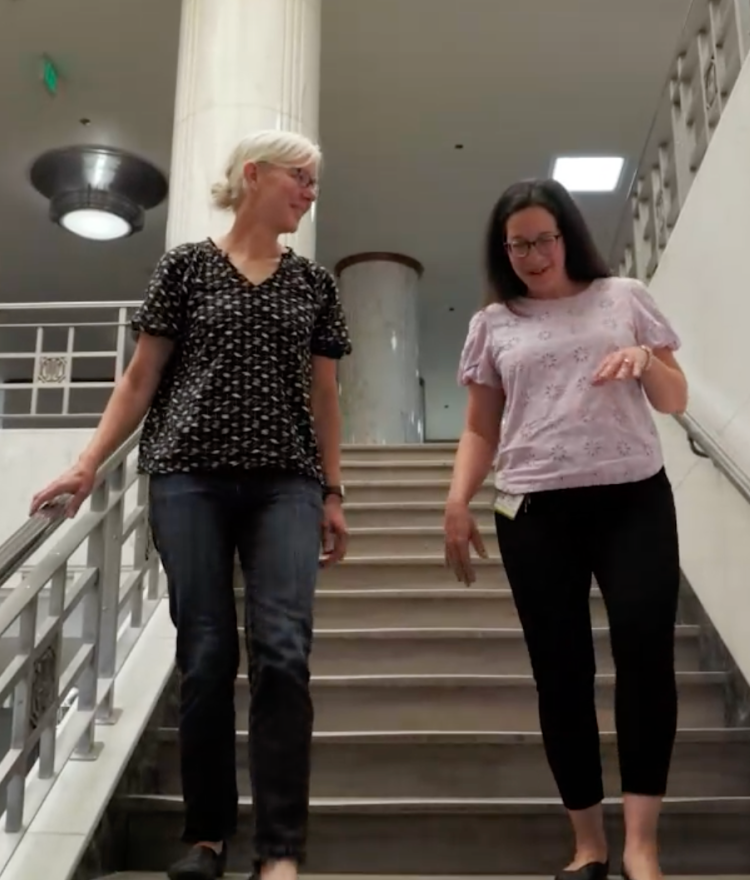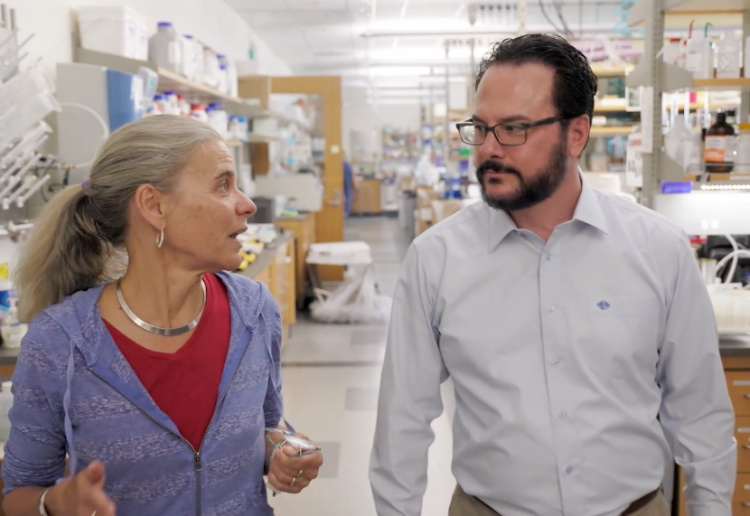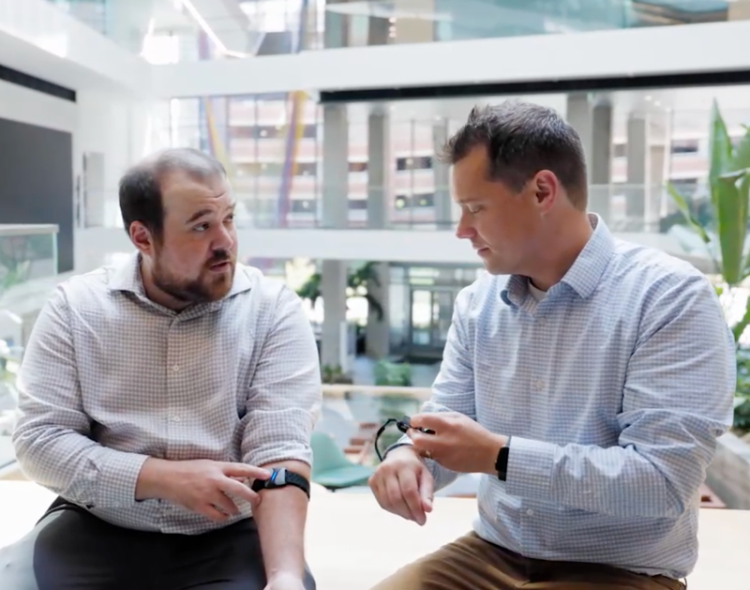AB Nexus transforming intercampus research collaboration after just three years

Stephanie Bryant (CU Boulder; Chemical and Biological Engineering) and Karin Payne (CU Anschutz; School of Medicine, Orthopedics)
When Stephanie Bryant and Karin Payne submitted a $125,000 collaborative proposal for seed funding from the new AB Nexus initiative in 2020, they couldn’t imagine that only a few years later the project—developing new therapies to regenerate cartilage—would be the catalyst for receiving n a $1.5 million grant from the National Science Foundation (NSF).
The four-year NSF grant, awarded in 2021, is another reason for sufferers of chronic joint pain to be hopeful about the future, and today Bryant and Payne are applying for even larger federal grants to further advance their work. While their research is still in its early phases, the process that cultivated their collaboration is an achievement in its own right.
The 2020 seed grant proposal—a collaboration between Bryant (CU Boulder; Chemical and Biological Engineering) and Payne (CU Anschutz; School of Medicine, Orthopedics)—represents more than the work of two of CU’s top researchers; it was an early sign that the AB Nexus initiative could help realize the vast potential of cultivating multidisciplinary collaborations across CU’s largest campuses.
“I think without AB Nexus, we probably would have never developed this new project,” said Payne, who is currently working with Bryant to grow cartilage tissue organoids in the lab using stem cells.
Origins and early wins
When scientists from different fields work together, great and unexpected things can happen.”
—Dr. Thomas Flaig, vice chancellor for research at CU Anschutz
In July 2020, the University of Colorado launched the AB Nexus initiative to expand research collaborations between the CU Anschutz and CU Boulder campuses. The vision was to combine expertise in biosciences, engineering, biotechnology, space, pharmacology, public health, mental health and other areas of strength to drive innovation, earn competitive research awards from external sponsors, and amplify the impact of both campuses to improve lives.
The initiative has been steadfastly championed by the CU president’s office and leadership at both campuses, with a combined $3 million dedicated to the program through 2023.
In its first year, AB Nexus focused on paving the way for more productive collaborations by strengthening existing areas of connectivity and supporting joint proposals like the Bryant/Payne project. Additionally, the program invested in dedicated research partnership specialists on both campuses, enhanced proposal development support, and tackled some of the operational hurdles that could hinder effective cross-campus research partnerships.
By July 2021, AB Nexus had already provided $1.2 million in seed funding to 16 project teams, including the Bryant/Payne team. With a solid foundation of support services and funding in place, the program was now poised to accelerate collaborative, multidisciplinary research projects on an unprecedented scale for the campuses.
Building momentum in year two

Karolin Luger (CU Boulder; Biochemistry) and Dan LaBarbera (CU Anschutz; Pharmaceutical Sciences)
By the spring 2022 grant competition, Dan LaBarbera (CU Anschutz; Pharmaceutical Sciences) and Karolin Luger (CU Boulder; Biochemistry) had become aware of the opportunity offered by AB Nexus. The University of Colorado Cancer Center was enthusiastic too, joining the effort as one of the first organizations to co-sponsor a seed grant.
The LaBarbera/Luger project was designed to explore a promising new compound for treating cancer. AB Nexus seed funding enabled the team to take important early steps toward identification and production of novel small molecule probes and lead drugs that target DNA damage repair and multi-drug resistance in cancer. This unique therapeutic strategy has the potential to improve treatments for many types of cancer—in particular breast, ovarian and pancreatic cancers.
LaBarbera sought out Luger’s expertise in structural biology for help identifying an efficient way to analyze a host of compounds to target cancer—one of many AB Nexus examples of complementary disciplines combining seamlessly to tackle a vexing health problem.
The team, which described AB Nexus as “an incredible opportunity and experience,” also noted working with the campus commercialization arms—CU Innovations at Anschutz and Venture Partners at CU Boulder—as a highlight of the experience. After all, discoveries in the lab are ultimately aimed at helping real-world patients.
Bridging gaps in year three

Robert Moulder (CU Boulder Research Scientist) and Patrick Romani (CU Anschutz; Psychiatry)
In the latest round of seed grant opportunities in spring 2023, a project led by Sidney D’Mello (CU Boulder; Computer Science, Psychology and Neuroscience, Institute of Cognitive Science) and Patrick Romani (CU Anschutz; Psychiatry) was funded to study the occurrence of severe problem behaviors in youth who are prone to harmful—and sometimes violent—outbursts.
Approaches for developmentally disabled youth with severe behavior problems currently fall short, often resulting in injury to family members and caregivers and property damage. Combining expertise in artificial intelligence (AI) with psychiatry, psychology, mathematics and neuroscience, the D’Mello/Romani team aims to identify physiologic signals that predict the occurrence of severe problem behavior. Their research could lead to an early warning system for caregivers so they can help to reduce the frequency and severity of adverse outcomes—a true game-changer for families struggling with this challenge.
In this project, AB Nexus helped bridge a gap in each Principal Investigator’s research agenda: integrating behavioral science with innovative computational modeling.
“I was really interested in this general line of research but knew that, with my clinical expertise, I was missing expertise in terms of being able to use complex methodologies to predict and to study these behaviors,” said Romani, who works as a clinical psychologist at Children’s Hospital Colorado. “Being able to collaborate and see things from a different perspective really helps break that ceiling so you can have a broader impact on the people you’re ultimately working for.”
This team also depends on significant contributions from Research Scientist Robert Moulder, who provides vital expertise in nonlinear modeling to illuminate how internal states affect observable behavior.
Because this area is a priority for the National Institute of Child Health and Development (NICHD), this team is well-positioned to unlock additional external federal funding to advance continued exploration into this promising area of research.
Three years of progress, a world of difference
- 263 collaborative proposalssubmitted to the grant program since 2020
- 48 proposals awarded by AB Nexus since 2020
- Joint campus proposals submitted to, and grants awarded by, external sponsors have increased by 40% since 2019
- Publications authored jointly by CU Anschutz/CU Boulder faculty have increased by 22% since 2019
Fast forward to fall 2023. The 48 teams who have received AB Nexus seed funding over six grant cycles embody the AB Nexus spirit, bringing together investigative teams from non-traditional collaborators to study important issues that require interdisciplinary expertise. Administrative obstacles have been removed, while collaborative support offices—including regulatory units such as IRB and core facilities directors—have also joined in the new, streamlined way of supporting intracampus research projects.
With three years of investment, progress and outcomes, program metrics bear out what the individual successes already suggest: AB Nexus is spurring more collaborations and the outcomes of those projects will eventually translate into life-changing solutions to improve human health and well-being.
Just as impactful as the number of new collaborations, proposals submitted and grants awarded, the research conducted is already informing clinical trials, aiding clinicians and shaping policy. Most important of all, AB Nexus projects are addressing some of the most challenging health problems facing our nation and the world—and driving us ever closer to solutions.
“This program has really paid off,” said Massimo Ruzzene, CU Boulder vice chancellor for research and innovation and dean of the institutes. “You can quantify the success of the program directly in the amount of research funding that it’s generated from outside sources.”
What’s next for AB Nexus?
Key Dates
Spring 2024 Collaborative Seed Grant Competition
- Feb. 1: Information session
- Feb. 16: Notice of intent deadline
- March 22: Proposal deadline
- May 15: Award notification
- July 1: Project start date
The collaborative seed grant program will continue full steam ahead in Spring 2024, including the introduction of award tracks to seed research in two new, key areas of opportunity: Climate Change and Health; and Artificial Intelligence/Advanced Computing and Health.
The program structure will also evolve based on learning from the first three years: there will be one round of collaborative seed grants held annually in spring; the project period will be extended from 12 months to 18 months; and award amounts for new collaborations will increase from $50,000 to $75,000.
“Great things can happen, and unexpected sorts of questions can be asked, when we work together,” said Flaig, “and I think that culture that’s being developed is really going to be one of those lasting things that AB Nexus can give us."
Visit the AB Nexus website for full schedule and details as they become available.

